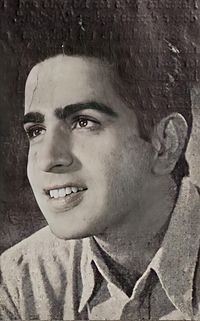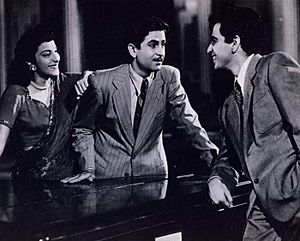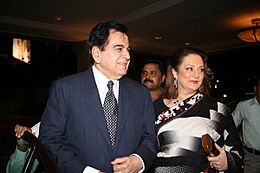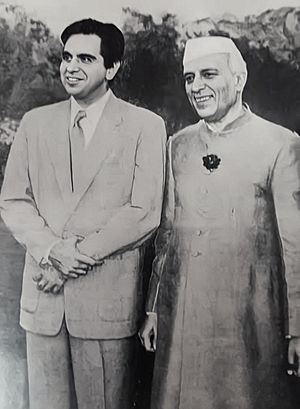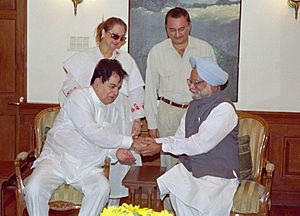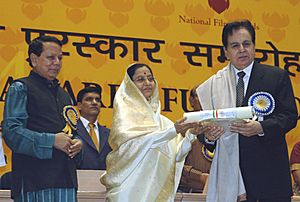Dilip Kumar facts for kids
Quick facts for kids
Dilip Kumar
|
|
|---|---|
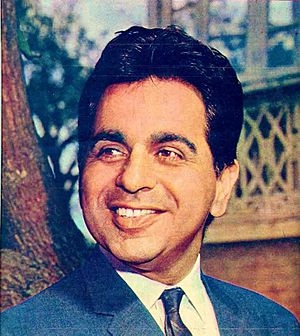
Dilip Kumar c. 1950s
|
|
| Born |
Mohammed Yusuf Khan
11 December 1922 |
| Died | 7 July 2021 (aged 98) Mumbai, Maharashtra, India
|
| Resting place | Juhu Qabrastan, Mumbai |
| Nationality |
|
| Other names | Tragedy King, The First Khan, Dilip Sahab |
| Occupation |
|
| Years active | 1944–1999 |
| Spouse(s) |
|
| Relatives |
|
| Awards |
|
| Honours |
|
| Member of Parliament, Rajya Sabha | |
| In office 3 April 2000 – 2 April 2006 |
|
| Constituency | Maharashtra |
| Signature | |
 |
|
Mohammed Yusuf Khan (born December 11, 1922 – died July 7, 2021), known as Dilip Kumar, was a famous Indian actor. He worked mainly in Hindi cinema, which is the Bollywood film industry. People called him the "Emperor of Acting" because he was so good at his craft.
Dilip Kumar was known for being one of the first actors to use "method acting" in movies. This means he deeply understood and became his characters. He was a top star from the late 1940s to the 1960s. He won the Filmfare Award for Best Actor eight times, which is a record! His movies were often very successful at the box office.
He acted in about 60 films over five decades. His first movie was Jwar Bhata in 1944. His first big hit was Jugnu in 1947. He starred in many popular films like Andaz (1949), Aan (1952), Devdas (1955), and the epic Mughal-E-Azam (1960). Mughal-e-Azam was the highest-grossing Indian film for 15 years!
In the 1970s, his career slowed down. He took a break from acting for four years. He returned in 1981 with the hit movie Kranti. He continued to act in successful films like Shakti (1982) and Saudagar (1991). His last movie was Qila in 1998. After acting, he served as a member of India's parliament from 2000 to 2006.
Dilip Kumar married actress Saira Banu in 1966. They lived in Mumbai. For his amazing work, the Indian government gave him the Padma Bhushan in 1991 and the Padma Vibhushan in 2015. These are very high civilian awards. He also received the Dadasaheb Phalke Award in 1994, which is India's highest award in cinema. In 1998, the government of Pakistan gave him their highest civilian award, the Nishan-e-Imtiaz. This made him the only Indian to receive this honor.
Contents
Early Life & Beginnings
Dilip Kumar was born as Mohammad Yusuf Khan on December 11, 1922. His family lived in Peshawar, which was then part of British India. He was one of twelve children. His father was a fruit merchant.
He went to school at the Barnes School in Deolali, India. His family had orchards there. He grew up in the same neighborhood as Raj Kapoor, who also became a famous actor and his friend. In 1940, he moved to Pune and started a dry fruit shop and a canteen. After India became independent in 1947, his family stayed in Mumbai.
Mohammad Yusuf Khan started acting under the name Dilip Kumar. This name was suggested by Devika Rani, a film producer. He said he chose a new name because his father did not approve of acting careers back then.
Film Career Highlights
Early Film Roles & Success
Dilip Kumar's first movie, Jwar Bhata (1944), was not very popular. But his fourth film, Jugnu (1947), was a big hit. He starred with Noor Jehan in it. Other successful films in 1948 were Shaheed and Mela. Both Jugnu and Shaheed were the highest-grossing Hindi films in their release years.
In 1949, he got a breakthrough role in Mehboob Khan's Andaz. He acted alongside Raj Kapoor and Nargis. Andaz became the highest-grossing Indian film at that time.
The 1950s: A Golden Decade
The 1950s were Dilip Kumar's most successful years. He starred in many hit movies. Some of these include Jogan (1950), Daag (1952), Devdas (1955), and Naya Daur (1957).
He often acted with famous actresses like Vyjayanthimala, Madhubala, and Nargis. Along with Raj Kapoor and Dev Anand, he was one of the biggest stars of the 1950s. This period is known as the golden era of Hindi cinema.
Many of his early films were sad or dramatic, earning him the nickname "Tragedy King." To balance this, he also took on lighter, more cheerful roles. For example, he played a thief in the comedy Azaad (1955). He developed a unique acting style, often speaking softly but showing many emotions.
He was the first actor to win the Filmfare Best Actor Award for Daag. He won this award seven more times. In the 1950s, he became the first Indian actor to charge a very high fee for a film.
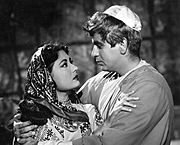
The 1960s: Epic Films & Production
In 1960, Dilip Kumar starred as Prince Salim in the grand historical film Mughal-e-Azam. This movie was the highest-grossing film in Indian history for 15 years. It was originally in black and white, but later fully colorized and re-released in 2004.
In 1961, he wrote, produced, and starred in Ganga Jamuna. He played the main role alongside his brother Nasir Khan. This was the only film he produced. The movie won several awards.
In 1962, the famous British director David Lean offered him a role in Lawrence of Arabia. Dilip Kumar turned down the role, which later went to Omar Sharif. He felt Omar Sharif did a better job than he could have.
His film Leader (1964) was not a big hit. In 1967, he played two roles as twins in the successful film Ram Aur Shyam. He also starred in Aadmi and Sunghursh in 1968.
The 1970s: A Career Shift
In 1970, Dilip Kumar acted with his wife Saira Banu for the first time in Gopi, which was a success. He also appeared in a Bengali film called Sagina Mahato.
However, some of his films in the 1970s, like Dastaan (1972) and Bairaag (1976), did not do well. He played three roles in Bairaag, and his acting was praised, but the film was not a hit. He took a break from films from 1976 to 1981.
The 1980s: Successful Return
In 1981, Dilip Kumar returned to acting, taking on older, more mature roles. His comeback film was Kranti, a big historical movie that was the year's biggest hit. He played a revolutionary fighting for India's freedom.
He then played "Angry Old Man" roles in films like Vidhaata (1982) and Shakti (1982). Vidhaata was the highest-grossing film of 1982. In Shakti, he acted with Amitabh Bachchan and won his eighth Filmfare Award for Best Actor. He also starred in Mashaal (1984) and Karma (1986).
The 1990s: Final Films
In 1991, Dilip Kumar starred with Raaj Kumar in Saudagar, which was his last big box office success. In 1994, he received the Filmfare Lifetime Achievement Award.
He was supposed to direct a film called Kalinga, but it was never finished. His last film appearance was in Qila in 1998, where he played two roles.
Later Years & Public Service
After his acting career, Dilip Kumar became a member of the Rajya Sabha, which is the upper house of India's parliament. He served from 2000 to 2006. He used his funds to help improve public gardens and areas in Mumbai.
His classic films Mughal-e-Azam and Naya Daur were colorized and re-released in cinemas.
Personal Life & Interests
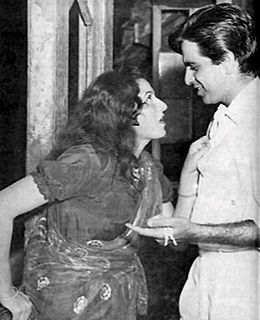
Dilip Kumar had a relationship with actress Madhubala for seven years. Their relationship ended after a film-related court case in 1957. They did not work together after Mughal-e-Azam (1960).
In 1966, Dilip Kumar married actress Saira Banu, who was 22 years younger than him. He also married Asma Rahman in 1981, but that marriage ended in 1983. Dilip Kumar and Saira Banu lived in Mumbai. They did not have children.
Dilip Kumar spoke many languages, including Hindko, Urdu, Hindi, and English. He loved music and even learned to play the sitar for a film. He also enjoyed cricket and played in charity matches. He had a close friendship with the Kapoor family, another famous film family.
His younger brother, Nasir Khan, was also an actor. Two of his younger brothers passed away in 2020 after getting sick.
Passing Away
Dilip Kumar passed away on July 7, 2021, at the age of 98, in Mumbai. He had been ill for a long time. The government of Maharashtra allowed him to be buried with state honors.
Many leaders shared their sadness, including the Prime Minister of India, Narendra Modi, and the President, Ram Nath Kovind. The Prime Minister of Pakistan, Imran Khan, also sent his condolences.
Legacy & Influence
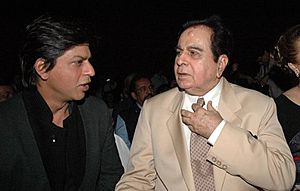
Dilip Kumar is seen as one of the greatest and most influential actors in Indian cinema history. He was a pioneer of "method acting," inspiring many actors who came after him, like Amitabh Bachchan and Shah Rukh Khan. Filmmaker Satyajit Ray called him "the ultimate method actor."
He was known as the "Emperor of Acting" and the "Tragedy King" due to his dramatic roles. He is also called "The First Khan" of Bollywood. Many people call him "The Kohinoor of Indian cinema" (Kohinoor is a famous diamond). He was the highest-paid actor in India during the 1950s and 1960s. This time is often called the "Golden Age of Hindi cinema."
He is considered the "First Superstar of Indian cinema" and had fans all over the world. In 2013, he was voted the "Biggest superstar of all time" by Filmfare magazine.
Dilip Kumar had a very high success rate with his films. Many of his movies were hits because people wanted to see him act. Even sad or serious films did well because of his performances. Director Hrishikesh Mukherjee called him "a phenomenon" and "a one-man industry."
In the later part of his career, he continued to have great success in mature roles. Actor Irrfan Khan said that no other actor has had such a big impact on people's hearts.
Awards & Recognition
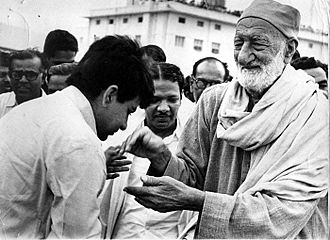
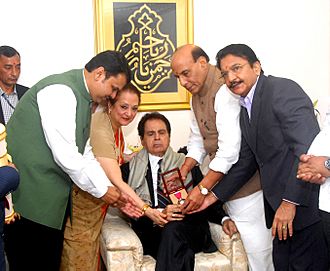
Dilip Kumar, Raj Kapoor, and Dev Anand were known as "the golden trio" of Indian cinema in the 1950s and 1960s. Dilip Kumar was the biggest star of this time.
He holds the record for having the most films that were the highest-grossing of the year (9 films). He also had at least one hit movie every year for 15 years straight, from 1947 to 1961. He did not have a single flop film for 15 years, from 1952 to 1965.
He won eight Filmfare Awards for Best Actor, more than any other actor. He also received a Filmfare Lifetime Achievement Award in 1993.
The Indian government honored him with the Padma Bhushan in 1991, the Dadasaheb Phalke Award in 1994, and the Padma Vibhushan in 2015. He also received the NTR National Award in 1997.
In 1998, the government of Pakistan gave him the Nishan-e-Imtiaz, their highest civilian award. Some people in India questioned this, but the Prime Minister of India, Atal Bihari Vajpayee, said there was no doubt about Dilip Kumar's loyalty to India. Dilip Kumar kept the award, saying it would help relations between the two countries.
His childhood home in Peshawar, Pakistan, was declared a national heritage monument in 2014.
Dilip Kumar was voted the "Greatest Indian Actor of All Time" in a 2011 poll. He holds a Guinness World Record for receiving the most awards by an Indian actor.
See also
 In Spanish: Dilip Kumar para niños
In Spanish: Dilip Kumar para niños
 | Emma Amos |
 | Edward Mitchell Bannister |
 | Larry D. Alexander |
 | Ernie Barnes |


